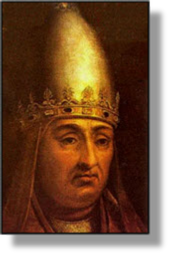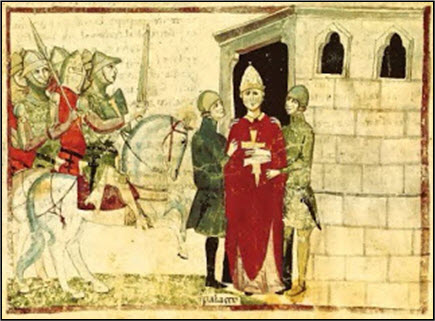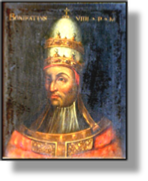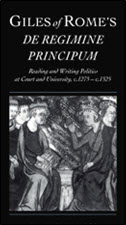


POPE BONIFACE VIII 1294 -
Life c1235 -
xxxxxBoniface VIII became pope in 1294 and was determined to assert his authority over secular rulers in general and Philip IV of France in particular. In 1296 his bull Clericis Laicos forbade monarchs to impose taxes upon their churches -
 xxxxxBenedict Caetani was born in Anagni in about 1235. After studying law in Bologna he held appointments in the papal government and also served in the embassies of France and England. He was appointed a cardinal in 1281 and in 1294 succeeded the incompetent Celestine V as Pope Boniface VIII.
xxxxxBenedict Caetani was born in Anagni in about 1235. After studying law in Bologna he held appointments in the papal government and also served in the embassies of France and England. He was appointed a cardinal in 1281 and in 1294 succeeded the incompetent Celestine V as Pope Boniface VIII.
xxxxxHis pontificate is best known for the bitter and running quarrel he had with the king of France, Philip IV, though his relations with Edward I were far from happy at times. Like other popes before him, Boniface was determined to assert the absolute authority of the papacy in all things. In 1296, aware that both Philip and Edward were imposing illegal taxes on their Churches, he issued his bull Clericis Laicos, forbidding such taxes without the pope’s consent. Because of the strong opposition this aroused, plus unrest at home, he was obliged to compromise on this ruling, allowing “voluntary grants” for purposes of defence. In 1301, however, after Philip had imprisoned one of his bishops, he accused the French king of exceeding his royal powers and suggested a council meet in Rome to reform the French methods of government! And he then followed this up in 1302 with his famous bull Unam Sanctam, boldly claiming that the pope had supreme authority over all rulers, in temporal as well as spiritual matters.

xxxxxThis was a step too far for Philip IV. He ignored the papal bulls, accused Boniface of heresy, and took steps to depose him. In 1303 his supporters, aided by enemies of the pope within Italy -
xxxxxBoniface VIII, like many popes before him, attempted to uphold the power and prestige of the papacy, but his blunt assertion of its secular power carried little weight, and his capture in 1303 was both degrading and humiliating. In fact, his pontificate was a turning point in the long and bitter struggle between church and state. From now on, the growing power being wielded by national monarchs was to prove a serious barrier to papal claims of supremacy in matters of state.

xxxxxIncidentally, a large number of statutes were erected in his honour, either by Boniface himself or by others, and several have survived. It would seem that whilst he failed to enhance the actual power and prestige of the Pope during his pontificate, he did manage to increase its future stature. Looking at the surviving statues, it is evident that the height of the papal tiara was notably extended and the number of crowns around the tiara was increased from one to two.

xxxxxDuring the political conflict between Boniface VIII and Philip IV, a powerful defence of the pope’s stand against the French king was made by Giles of Rome (c1243-
E1-
Acknowledgements
Boniface VIII: date and artist unknown. Prisoner: 14th century miniature, contained in The New Chronicles, the work of the Italian historian Giovanni Villani (c1275-
Including:
Giles of Rome



